Related Research Articles
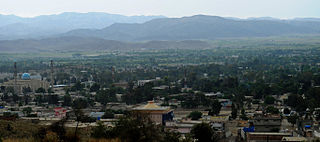
Khōst is the capital of Khost Province in Afghanistan. It is the largest city in the southeastern part of the country, and also the largest in the region of Loya Paktia. To the south and east of Khost lie Waziristan and Kurram in Pakistan. Khost is the home of Shaikh Zayed University. The Khost Airport is located in the eastern area of the city.

Khost is one of the 34 provinces of Afghanistan located in the southeastern part of the country. Khost consists of thirteen districts and the city of Khost serves as the capital of the province. Historically, Khost used to be a part of Paktia and a larger region surrounding Khost is still referred to as Loya Paktia.
The Zazi, also spelled Zazai, or Jaji, is a Karlani Pashtun tribe. They are found in Paktia and Khost provinces in the Loya Paktia region of southeastern Afghanistan, as well as Kurram Valley of Pakistan, but also have an effective presence in Kabul, Logar, Ghazni, Nangharhar, Kunduz, and Baghlan in Afghanistan.
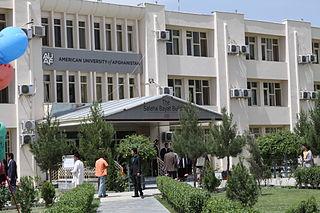
Education in Afghanistan includes K–12 and higher education, which is under the Ministry of Education and Ministry of Higher Education. In 2021, there were nearly 10 million students and 220,000 teachers in Afghanistan. The nation still requires more schools and teachers. Soon after the Taliban takeover of the country in August 2021, they banned girls from secondary education. Some provinces still allow secondary education for girls despite the ban. In December 2022, the Taliban government also prohibited university education for females in Afghanistan, sparking protests and international condemnation.
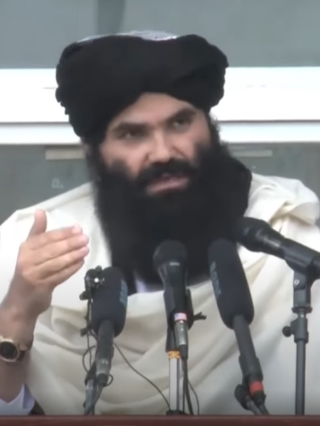
Sirajuddin Haqqani is an Afghan warlord who is the first deputy leader of Afghanistan and the acting interior minister. He has been a deputy leader of the Taliban since 2015, and was additionally appointed to his ministerial role after the Taliban's victory over Western-backed forces in the 2001–2021 war. He has led the Haqqani network, a semi-autonomous paramilitary arm of the Taliban, since inheriting it from his father in 2018, and has primarily had military responsibilities within the Taliban.
The following lists events that happened during 2004 in Afghanistan.

Nadir Shah Kot District is situated in the western part of Khost Province, Afghanistan. It borders Paktia Province and Shamal District to the west, Qalandar District to the north, Musa Khel District to the northeast, Khost (Matun) District to the east, Mandozayi District to the southeast and Tani and Spera districts to the south.

Women's rights in Afghanistan have oscillated back and forth depending on the time period as well as the regime in power. After King Amanullah Khan's attempts to modernize the country in the 1920s, women officially gained equality under the 1964 Constitution. However, these rights were taken away in the 1990s through different temporary rulers such as the mujahideen and the Taliban during the Afghan civil war. During the first Taliban regime (1996–2001), women had very little to no freedom, specifically in terms of civil liberties. When the Taliban was overthrown by the United States following the 9/11 attacks, women's rights gradually improved under the presidential Islamic Republic of Afghanistan. Women were de jure equal to men under the 2004 Constitution.
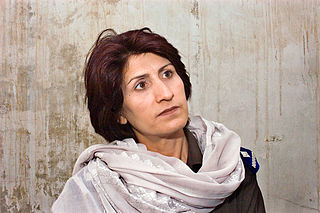
Malalai Kakar was the most high-profile policewoman in the Islamic Republic of Afghanistan (2001–2021) during its existence.

Fawzia Koofi is an Afghan politician, writer, and women's rights activist. Originally from Badakhshan province, Koofi was recently a member of the Afghan delegation negotiating peace with the Taliban in Doha Qatar. She is an ex Member of Parliament in Kabul and was the Vice President of the National Assembly.
The following lists events that happened during 2015 in Afghanistan.

Zarifa Ghafari is a former female mayor of Maidan Shahr, capital city of the Wardak Province, Afghanistan. Ghafari was one of the few Afghan female mayors, next to the first Afghanistan's mayor, Azra Jafari and Khadija Zahra Ahmadi, and was also the youngest to be appointed, at the age of 24. She is known for her efforts to advance women's rights in Afghanistan. Ghafari was chosen as an International Woman of Courage in 2020 by the US Secretary of State. She has survived three assassination attempts.
In May 2020, a series of insurgent attacks took place in Afghanistan, starting when the Taliban killed 20 Afghan soldiers and wounded 29 others in Zari, Balkh and Grishk, Helmand on 1 and 3 May, respectively. On 12 May, a hospital's maternity ward in Kabul and a funeral in Kuz Kunar (Khewa), Nangarhar were attacked, resulting in the deaths of 56 people and injuries of 148 others, including newborn babies, mothers, nurses, and mourners. ISIL–KP claimed responsibility for the funeral bombing, but no insurgent group claimed responsibility for the hospital shooting.
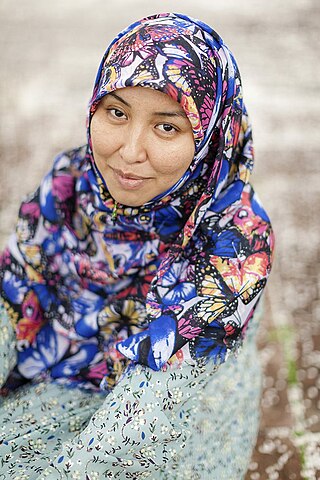
Salima Mazari is an Afghan politician, who served as the District Governor of Charkint District in Balkh province in Afghanistan and one of the three women district governors in Afghanistan.
Protests in Afghanistan against the Taliban started on 17 August 2021 following the Fall of Kabul to the Taliban. These protests are held by Islamic democrats and feminists. Both groups are against the treatment of women by the Taliban government, considering it as discriminatory and misogynistic. Supported by the National Resistance Front of Afghanistan, the protesters also demand decentralization, multiculturalism, social justice, work, education, and food. There have been pro-Taliban counterprotests.
Zahra Joya is an Afghan journalist. She is the founder of Rukhshana Media, an outlet in Persian and English which she runs from exile.
Events in the year 2023 in Afghanistan.
Razia Barakzai is an Afghan women's rights activist. She was named one of the BBC's 100 Women in 2021 for her work in leading the first women's protests against the Taliban in August 2021, following their takeover of Afghanistan that same month.
References
- ↑ "BBC 100 Women 2021: Who is on the list this year?". BBC News. 2021-12-07. Retrieved 2023-09-21.
- 1 2 3 4 5 "Meet Afghanistan's female deputy chief of police". The New Arab. 2020-07-07. Retrieved 2023-09-20.
- 1 2 3 "Afghanistan: Turkey-trained female cop gets senior post". Andalou Agency. Retrieved 2023-09-20.
- ↑ "Amid violent reprisals, Afghans fear the Taliban's 'amnesty' was empty". BBC News. 2021-08-31. Retrieved 2023-09-20.
- ↑ Jardine, Melissa (August 23, 2021). "The world must evacuate women police in Afghanistan". Lowy Institute. Retrieved 2023-09-20.